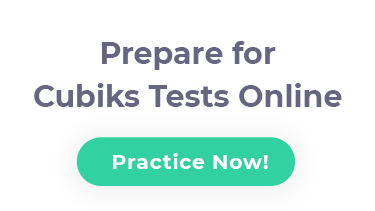Cubiks Verbal Reasoning Test Preparation – 2025

What Is the Cubiks Verbal Reasoning Test?
Cubiks, a globally recognized consulting firm specializing in psychometric assessments, operates in over 50 countries and provides online tests used by reputable employers for recruitment, employee development, and talent management. These assessments are user-friendly and encountered by job applicants during hiring and by current employees for career development. One key assessment offered by Cubiks is the Verbal Reasoning Test, which is integral to their psychometric evaluations. This test evaluates candidates’ verbal reasoning skills, assessing their ability to extract information, make logical inferences, and apply critical thinking. Candidates navigate passages of diverse topics, answering questions that test their identification of analogies, syllogisms, antonyms, and differences. This test is crucial for employers to gauge proficiency in verbal reasoning—a skill vital in various professional roles.
Cubiks Verbal Reasoning Test Format
The Cubiks verbal reasoning test consists of 25 multiple-choice questions to be answered in 35 minutes. Candidates are required to read and comprehend passages, answering questions that assess their ability to identify analogies, syllogisms, antonyms, and differences. No prior knowledge is necessary, as the answers are always within the provided text. Candidates can use a calculator during the exams, and there is no penalty for incorrect answers, encouraging candidates to make educated guesses.
Cubiks Verbal Reasoning Test Sample Questions
Verbal reasoning tests assess a candidate’s aptitude and ability to comprehend written information, analyze it, and draw logical conclusions. Here are some example questions:
Statement Evaluation:
Read the following statement and decide whether it’s true or false or if you cannot determine based on the information provided.
Example Question 1: “All mammals can fly.”
Analogies:
Identify the relationship between two words and choose a pair with a similar relationship from the options.
Example Question 2: “Cat is to meow as dog is to _____.”
- Bark
- Purr
- Tweet
- Squeak
Reading Comprehension:
Answer questions based on a passage of text.
Example Question 3: Read the following passage and answer the question: “What is the main idea of the passage?”
Sentence Completion:
Complete a sentence with the most appropriate word.
Example Question 4: “The detective carefully examined the _____ evidence to solve the case.”
- Crucial
- Insignificant
- Perplexing
- Discreet
Critical Reasoning:
Evaluate the logical validity of statements or arguments.
Example Question 5: “If it rains, then the ground will be wet. The ground is wet; therefore, it must have rained. Evaluate the validity of this statement.”
Antonyms:
Identify the word with the opposite meaning.
Example Question 6: Choose the antonym for “Benevolent.”
- Malevolent
- Gracious
- Generous
- Altruistic
Answers:
- False
- A
- –
- A
- Valid
- A
Tips to Excel in Cubiks Tests:
Preparing for Cubiks verbal reasoning tests requires a focused and structured approach. Here’s a specific guide emphasizing practice tests and sample questions:
- Access Practice Tests: Visit official websites and explore the available practice tests. There are often sample questions that mirror the actual test format. These resources are invaluable for understanding the style and content of the questions.
- Daily Practice Sessions: Dedicate time each day for focused practice sessions, ideally a week to ten days before your scheduled test. Work through a variety of verbal reasoning sample questions to cover different question types such as analogies, syllogisms, antonyms, and sentence completions.
- Simulate Test Conditions: Prepare and practice under timed conditions to simulate the actual test environment. This helps improve your time management skills and ensures you are accustomed to completing questions within
- Expand Vocabulary: Since verbal reasoning often involves understanding the meaning of words, work on expanding your vocabulary. Read a variety of materials and expose yourself to different writing styles.
- Seek Additional Resources: Consider using reputable verbal reasoning preparation books or online platforms that offer additional sample questions and explanations.
Remember, consistent and focused practice, along with a thorough understanding of the question types, is vital to performing well in Cubiks verbal reasoning tests.

